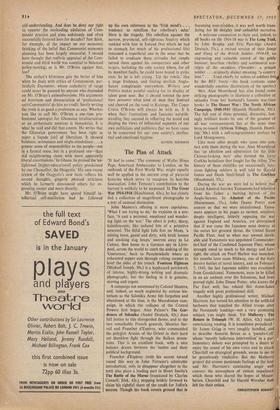Up (Some) Rebels
Writers and Politics. By Conor Cruise O'Brien. (Chatto and Windus, 25s.) Writers and Politics. By Conor Cruise O'Brien. (Chatto and Windus, 25s.)
CONOR CRUISE O'BRIEN's collected essays are more important than their intrinsic literary and philosophical merit alone would make them. Their author's tenure of brief authority during the United Nations' first experiment in ruling a country and waging a war adds interest to any- thing which throws further light on his outlook and motivations. Furthermore, Mr. O'Brien offers an explicit apologia for left-wing double stan- dards where his fellow-bearers of the double standard take refuge in silence. In explaining why he both refrains from criticising Communist. and Afro-Asian dictatorships and denies the right of Western commentators to do so, he writes: The English-speaking critic and analyst is —or should be—led to criticise and analyse the phenomena of his own contemporary cul- ture, which is increasingly dominated by values prevalent in the USA. The distortions and mis- leading facades which he will most often encounter . . . are pro-American and anti- Communist. . . Of course . . . in the Com- munist world and in the poor world of Asia and Africa there are also distortions and facades. usually much more blatant and there- fore less insidious than those prevalent in the West. . . . I have not felt any great need to add my amateur efforts to those of the numerous pro- fessional critics • . . the liberation of the Com- munist world and the poor world from their crude forms of mendacity . . . and of the Western world from its subtler and perhaps deadlier forms of mendacity will also have to proceed from within. From the other side we can hear a few writers. Poles, Russians, Hungarians and others busily chipping away. . . . What might help would be that from our side also, should be heard the sound of chipping.
Now when you consider the chorus of self- criticism and self-hate which makes our society and age unique in human history, you are left wondering what has gone wrong with Mr. O'Brien's hearing if he is really waiting to hear 'the sound of chipping from our side also.' Has he perhaps deafened himself by his own shout- ing, or is he suffering from the left-wing occupa- tional hazard of hyper-selective hearing? The idea that analysts should confine themselves to their own society and write in a rebellious vein at all costs seems curiously undergraduate, and. in essence, parochial. Mr. O'Brien's repeated complaints that our society 'insidiously' makes it harder for the rebel by providing so much las to complain about, and by 'subtler forms of mendacity'—i.e., arguments he cannot counter but compulsively rejects—confirm the impression that he values rebellion for its own sake.
I find it hard to believe that Mr. O'Brien has thought out to its conclusion his demand that we cease critical appraisal of the Communist and Afro-Asian countries. For one thing, human society is one phenomenon; understanding of other societies adds essential dimensions to our self-understanding. And does he deny our right to counter the misleading adulation of Com- munist practice and aims sedulously and often successfully fostered here for decades? Just think, for example, of the impact on our economic thinking of the belief that Communist economic planning has been largely successful. I should have thought that realistic appraisal of the Com- munist and third world was essential to balanced policy-making; or is Mr. O'Brien against that, too?
The author's bitterness gets the better of him when he deals with critics of Communism, par- ticularly Encounter, whose catholicity of range could never be guessed by anyone who depended on Mr. O'Brien's animadversions. His arguments ad hominem and denunciation of `professional anti-Communists' do him no credit. Surely writing the truth is as good a profession as any. Whether you like to call Mr. O'Brien a one-time pro- fessional apologist for Ghanaian totalitarianism or an enthusiastic amateur is immaterial. It is what he said and did that counts. He writes that the Ghanaian government 'has been right to reject a façade [sic] of liberalism. It showed boldness, seriousness and single-mindedness ... a greater sense of responsibility to the people—not in a formal sense, but in a profound one—than did neighbouring states with more apparently liberal constitutions.' In Ghana, he praised the 'en- lightened [higher-educational] policy proclaimed by our Chancellor, the Osagyefo.' His own recent review of the Osagyefo's new book reflects his second thoughts, gingerly phrased strictures which he formerly denounced others for ex- pressing sooner and more directly.
Mr. O'Brien might have spared himself in- tellectual self-mutilation had he followed
up his own reference to the 'Irish mind's . . tendency to rebellion for rebellion's sake.' Here is the tragedy. His rebellion against the narrow, provincial, self-righteous Jesuitry which rankled with him in Ireland (but which he had to stomach for much of his professional life) remained a superficial one in the sense that he failed to eradicate these attitudes but simply turned them against his compatriots and other targets, including the only society where, for all its manifest faults, he could have hoped to strike root. So he is left crying, 'Up the rebels,' like a stage Irishman, and finding devilish Anglo- Saxon conspiracies everywhere. Writers and Politics makes painful reading for its display of talent gone sour. But it should remind the new bien pensants what kind of man they lionised and cheered on the road to Katanga. The Conor Cruise O'Briens will always be with us. It is when their frustrations and fantasies notwith- standing they succeed in reflecting the mood and shaping the views of influential segments of our own politicians and publicists that we have cause to be concerned for our own society's intellec- tual and emotional hygiene.
ALFRED SHERMAN































 Previous page
Previous page